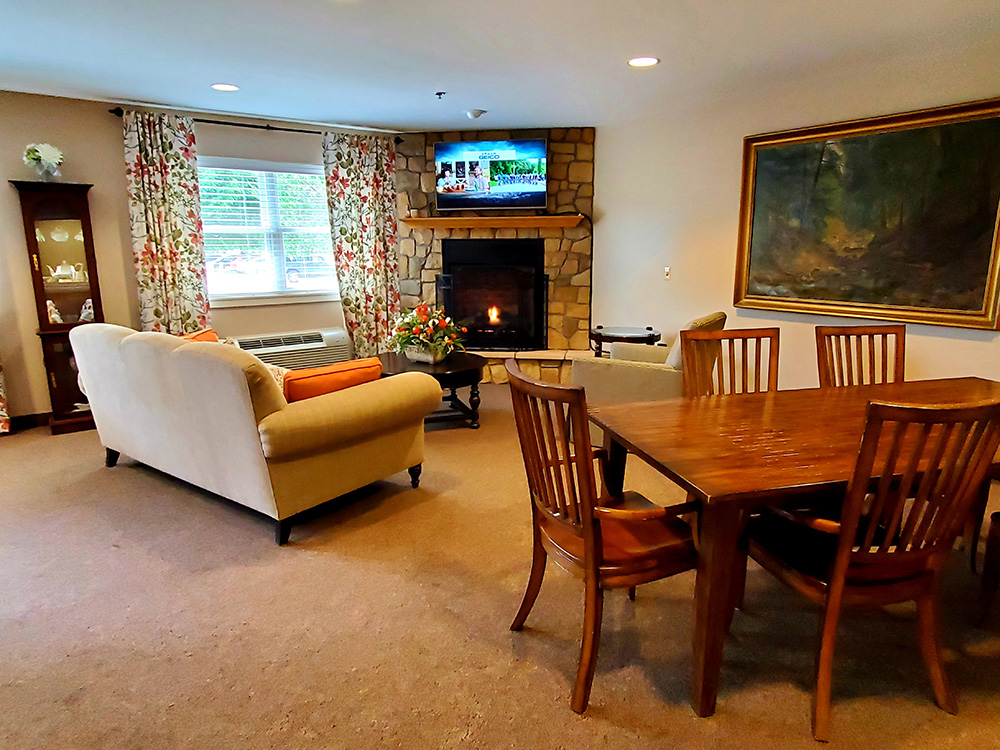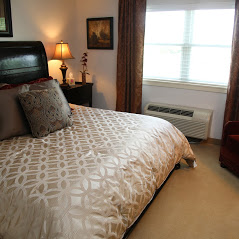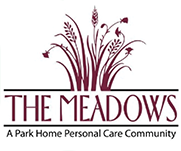- Call: 570-433-4663
Family Resources
Is Personal Care Right For Me?
A personal care home is a residential facility that provides living space and meals, along with personal care services, assistance with the tasks of daily living, and supervision to adults who no longer wish to, or who are no longer able to, live on their own.
Residents generally are mobile, active, older adults; however, personal care homes also are able to provide care for individuals who have physical, behavioral, or cognitive disabilities that do not require skilled nursing care but who otherwise are unable to care for themselves.

Personal Care Home staff take care of routine tasks such as cooking, cleaning, and other chores, leaving you with more time for things you enjoy, such as spending time with friends or engaging in hobbies and other interests.
In Pennsylvania, personal care homes are licensed by the Department of Public Welfare. Personal care homes are different from assisted living facilities, which are designed to allow residents to "age in place" regardless of the level of care they may require, and nursing homes, which are designed for individuals who require skilled nursing or rehabilitation services.

Many seniors move to a personal care facility while they are still in great health and functioning well at home.
Some signs that it may be time for you or a loved one to consider a personal care home include:
- Fear of living alone or falling
- Inability to provide proper meals or nutrition
- Forgetting to take medications
- Missing appointments
- Needing help with bathing or dressing
- Feelings of loneliness or isolation
- Inability to clean and maintain your home
Items to Bring
At The Meadows, we offer bright, spacious private-rooms and a relaxing atmosphere. You can expect to feel at home almost as soon as you arrive. Staff members are available 24-hours a day, and we’re eager to help you settle in to your new space. Although we offer, or are able to provide, many essentials you may require, here is a short list of items you should bring with you:
- Photo I.D.
- All insurance cards, such as Medicare or Medicaid
- Proof of power of attorney, if you have one
- Copies of any advance directives you may have, such as a living will, healthcare proxy or Do Not Resuscitate order from your physician
- Clothing
- Walking shoes
- Pajamas or other clothing for sleeping
- Preferred Toiletries
We also encourage you to bring your own furniture and other belongings to personalize your residence.

There's No Place Like Home... For Growing Old
Remaining in your own home as you age is becoming easier through the growth of services and support through government funding. With pre-planning to ensure that your needs are met and to prepare a Plan B in case of unexpected changes, you can enjoy the best quality of life wherever you are.
For you to thrive at home, these needs must be met:
- Home is clean and easy to navigate without risk of falling
- Nutritious food is available daily
- Medications are taken as prescribed
- Personal hygiene is maintained
- Regular social interaction is available
Even if you can’t do all of those things, you can find help through friends, family, church and a growing number of services. A good resource is the STEP Office of Aging in Williamsport, 570-326-0587, which can help you find assistance with cleaning, shopping, transportation, social activities, nursing care and meeting other needs. Some services may be eligible for payment through a recent Federal grant aimed to serve more elderly and disabled Pennsylvanians in their own homes.
Because it’s difficult to notice changes that indicate you need assistance, enlist a friend or family member to alert you if they notice things are getting off track. Things to look for include:
- A change in health or death of one spouse—sometimes one spouse’s capabilities can mask deficits in another
- A fall
- Lack of cleanliness of the home, clothing or individual
- No food or moldy food in the refrigerator
- Extreme weight loss or gain
- Missed appointments
- Frequent emergency room visits
- Evidence of a fire in the cooking area
All of these changes should be investigated. Waiting too long to fill in the gaps could impact your health.
If you have adult children who live far away, they can keep tabs by contacting clergy, friends, a housekeeper or others who interact with you regularly. During telephone calls expect them to ask you about social activities, meals and your general satisfaction with life.
You should also ask for your healthcare provider’s recommendations about the best living environment for you as medical changes occur. Because chronic illness and physical changes can affect a person’s ability to remain at home, it’s best to investigate other living options before the need suddenly arises. There are three main types of long-term care facilities:
Independent care — for people who can take care of all of their needs but prefer living without the responsibilities of a home.
Personal care — assistance with tasks such as personal hygiene, managing medications, meal preparation may be needed but would be able to evacuate the building without assistance.
Skilled care — also referred to as a nursing home, is for individuals who require nursing care 24/7 either temporarily or long-term. You can compare Medicare and Medicaid-certified nursing homes at Medicare.gov/NursingHomeCompare.
In addition to touring facilities on your short list by appointment, stop by unexpectedly. Make note of how residents look — Is their hair brushed? How does the place smell? Is it clean? Are call bells being answered? Does the calendar show activities for residents of all skill levels?
One more option to consider is using skilled nursing care temporarily for a “tune up.” This is becoming more popular as patients are discharged from the hospital earlier in their recovery. Individuals can self-refer for a two to three week stay to receive extra support as they recover from an illness or health set-back. This care option ensures that you feel strong enough to return home safely and can often prevent re-hospitalization or more significant health issues down the road. While not covered by Medicare without a three day hospital stay, you can check your policy or insurance provider for information about using skilled nursing benefits.

